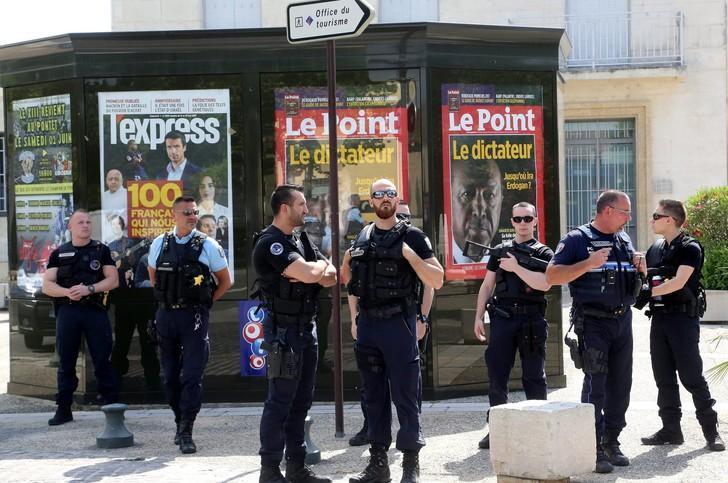
French magazine Le Point said it had suffered harassment and intimidation by supporters of Turkish President Recep Tayyip Erdoğan after it labelled him “The Dictator” on its front cover.
Police were deployed in the southern city of Avignon over the weekend after a group of pro-Erdoğan activists attempted to remove, then cover up advertisements for the magazine at newsstands, Agence France-Presse reported.
Another poster of the front cover—a portrait of Erdoğan above the headline “The Dictator. How far will Erdoğan go?”—was targeted at a newspaper kiosk in the town of Valence on May 27, Le Point said.
“After a week of harassment, insults, intimidation and anti-Semitic slurs and threats towards us on social media, now has come the moment when supporters of [Erdoğan’s ruling] Justice and Development Party [AKP] are attacking symbols of freedom of expression and diversity in the press,” Le Point said on its website.
French President Emmanuel Macron rallied behind the magazine May 28 calling the harassment “totally unacceptable.”
“You cannot put a price on freedom of the press, without it, it’s dictatorship,” he tweeted.
The left-leaning weekly, one of France’s most popular news magazines, published an investigation into the Turkish strongman in its latest edition, which also included an editorial. “Is Erdoğan a new Hitler?” it asked.
Turkish officials reacted almost immediately to the labeling of the top Turkish official.
“A French magazine called President Erdoğan a ‘dictator,’” presidential spokesman İbrahim Kalın wrote on his Twitter account on May 24.
“We know these attacks. We know what their purpose is. The nation and oppressed people see what is happening. The days that Turkey had taken instructions from you are over. You cannot bring them back by calling [Erdoğan] a ‘dictator,’” he said.
Erdoğan and the longtime ruling Justice and Development Party (AKP), which he co-founded in 2001, are seeking another mandate ahead of snap parliamentary and presidential polls on June 24.
The Turkish president imposed a state of emergency following an attempted coup in July 2016, which has sparked a crackdown affecting “hundreds of thousands of people,” including killings and torture, according to the United Nations rights office.
The report in March this year also warned about “a continued erosion of the rule of law and deterioration of the human rights situation,” including the arrests of hundreds of journalists and opposition members.
Ankara slammed the findings as “biased” and “unacceptable.”
Christophe Deloire, the head of media freedom group Reporters without Borders, said that the incidents in France were “isolated but have a strong symbolic resonance.”
One of the leading figures in France’s ruling Republic on the Move party, Richard Ferrand, called the protests in southern France an “unacceptable breach of the freedom of expression.”
“We are not going to tolerate in France that the front cover of a magazine be somehow censored under pressure,” he told the France 3 channel on May 27.
Many European countries are home to large Turkish-origin or migrant communities, but Germany, Austria and the Netherlands have barred Turkish politicians from electioneering in their countries.
Around three million expatriate Turks are allowed to vote in the elections next month, including 1.4 million in Germany.
A year ago Germany and other European countries also banned a series of planned Turkish campaign events for a referendum that extended Erdoğan’s powers.
Erdoğan at the time denounced Germany’s “Nazi practices” and accused it of harboring Kurdish “terrorists” and plotters of the failed coup against him.